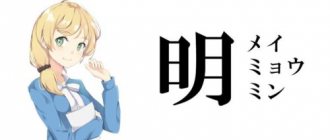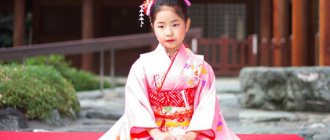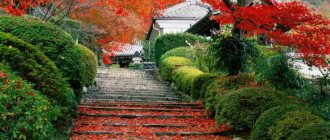Japanese names and their meanings
Ai - F - Love Aiko - F - Beloved child Akako - F - Red Akane - F - Sparkling red Akemi - F - Dazzlingly beautiful Akeno - M - Clear morning Aki - F - Born in autumn Akiko - F - Autumn child Akina - F - Spring flower Akio - M - Handsome Akira - M - Smart, quick-witted Akiyama - M - Autumn, mountain Amaya - F - Night rain Ami - F - Friend Amida - M - Buddha's name Anda - F - Met in the field Aneko - F - Elder sister Anzu - F - Apricot Arata - M - Inexperienced Arisu - F - Jap.
form of the name Alice Asuka - F - Fragrance of Tomorrow Ayame - F - Iris Azarni - F - Thistle Flower Benjiro - M - Enjoying the World Botan - M - Peony
Chika - F - Wisdom Chikako - F - Child of Wisdom Chinatsu - F - Thousand Years Chiyo - F - Eternity Chizu - F - Thousand Storks (implies longevity) Cho - F - Butterfly
Dai - M/F - Great Daichi - M - Great First Son Daiki - M - Great Tree Daisuke - M - Great Help
Etsu - F - Delightful, charming Etsuko - F - Delightful child Fudo - M - God of fire and wisdom
Fujita – M/F – Field, meadow
Gin - F - Silver Goro - M - Fifth son
Hana - F - Flower Hanako - F - Flower Child Haru - M - Born in Spring Haruka - F - Distant Haruko - F - Spring Hachiro - M - Eighth Son Hideaki - M - Brilliant, excellent Hikaru - M/F - Light, shining Hide - F - Fertile Hiroko - F - Generous Hiroshi - M - Generous Hitomi - F - Doubly beautiful Hoshi - F - Star Hotaka - M - Name of a mountain in Japan Hotaru - F - Firefly
Ichiro - M - First son Ima - F - Gift Isami - M - Courage Ishi - F - Stone Izanami - F - Attractive Izumi - F - Fountain
Jiro - M - Second son Joben - M - Loving purity Jomei - M - Bringer of light Junko - F - Pure child Juro - M - Tenth son
Kado - M - Gate Kaede - F - Maple Leaf Kagami - F - Mirror Kameko - F - Turtle Child (symbol of longevity) Kanaye - M - Diligent Kano - M - God of Water Kasumi - F - Fog Katashi - M - Hardness Katsu - M — Victory Katsuo — M — Victorious child Katsuro — M — Victorious son Kazuki — M — Joyful world Kazuko — F — Cheerful child Kazuo — M — Dear son Kei — F — Respectful Keiko — F — Adored Keitaro — M — Blessed Ken — M — Big man Ken`ichi — M — Strong first son Kenji — M — Strong second son Kenshin — M — Heart of the sword Kenta — M — Healthy and brave Kichi — F — Lucky Kichiro — M — Lucky son Kiku — F — Chrysanthemum Kimiko — F — Child of noble blood Kin — M — Golden Kioko — F — Happy child Kisho — M — Having a head on his shoulders Kita — F — North Kiyoko — F — Purity Kiyoshi — M — Quiet Kohaku — M/F — Amber Kohana — F — Small flower Koko - F - Stork Koto - F - Jap. musical instrument "koto" Kotone - F - Sound of koto Kumiko - F - Eternally beautiful Kuri - F - Chestnut Kuro - M - Ninth son Kyo - M - Concord (or red) Kyoko - F - Mirror
Leiko - F - Arrogant
Machi - F - Ten thousand years Machiko - F - Lucky child Maeko - F - Honest child Maemi - F - Sincere smile Mai - F - Bright Makoto - M - Sincere Mamiko - F - Child Mami Mamoru - M - Earth Manami - F - Beauty of Love Mariko - F - Child of Truth Marise - M/F - Infinite Masa - M/F - Straightforward (person) Masakazu - M - First Son Masa Mashiro - M - Wide Matsu - F - Pine Mayako - F - Child Maya Mayoko - F - Child Mayo Mayuko - F - Child Mayu Michi - F - Fair Michie - F - Gracefully hanging flower Michiko - F - Beautiful and wise Michio - M - Man with the strength of three thousand Midori - F - Green Mihoko - F - Child Miho Mika - F - New moon Miki - M/F - Stem Mikio - M - Three intertwined trees Mina - F - South Minako - F - Beautiful child Mine - F - Brave protector Minoru - M - Seed Misaki - F - Flowering beauty Mitsuko - F - Child of Light Miya - F - Three Arrows Miyako - F - Beautiful March Child Mizuki - F - Beautiful Moon Momoko - F - Peach Child Montaro - M - Big Guy Moriko - F - Child of the Forest Morio - M - Forest Boy Mura — F — Village Mutsuko — F — Child Mutsu
Famous people named Mina
- Mina Keshwar Kamal, known as Mina ((1956-1987) Afghan feminist. Fought for women's rights in her country.)
- Mina Loy ((1882-1966) née Mina Levy, English artist, writer, poet, playwright. A prominent representative of bohemianism. She also designed lamps.)
- Mina Karadzic ((1828-1894) full name - Vilhelmina Karadzic-Vukomanovic, Serbian artist, writer and poet)
- Mina ((born 1940) real name - Mina Anna Mazzini, Italian singer)
- Mina Shum ((born 1966) is a Canadian director. She is the author and director of award-winning feature films, numerous short films, special installations for theaters. Her films “Double Happiness” and “Long Life, Happiness and Prosperity” received the Wolfgang Staudte Prize for the best first role at the Berlin Film Festival and the Audience Award in Turin.)
- Mina Nouri ((b.1951) Iranian artist)
- Mina Lee ((born 1981) South Korean professional golfer who plays on the American LPGA Tour)
- Mina Kwon ((born 1993) known under the stage name Mina, South Korean singer and actress)
- Mina Matsushima ((born 1991) Japanese swimmer, participant of the 2012 Olympic Games)
- Mina Papatheodorou-Valiraki (Greek artist specializing in sports-related subjects)
- Mina Ahadi ((b.1956) Iranian political activist)
- Mina Kostic ((born 1975) birth name - Minira Jashari, Serbian turbo-folk singer)
- Mina Myoi ((born 1997) Japanese singer and dancer of the famous group “Twice”)
Source
[Total Votes: 0 Average: 0/5]
Japanese names
Traditionally, beautiful Japanese names consist of several parts, which include the person's surname and personal name. This practice is very common in many Asian countries. Typically, Japanese names are written using kanji, the pronunciation of which may vary depending on the occasion. On this site you can find the most beautiful, in our opinion, Japanese names and their meanings.
Names and Surnames of Japanese Emperors
| Lifetime name | Posthumous name |
| Kamu-yamato-ivarehiko-no-mikoto | Jimmu-tenno (Emperor Divine Warrior) |
| Mutsuhito | Meiji-tenno (Emperor of Enlightened Rule) |
| Hirohito | Showa-tenno (Emperor of the Enlightened World) |
During the life of the emperor, it is also not customary to address him by name, since in general it is not polite to address him by name, much less to the emperor, and instead various titles are used. For example, as a child, Akihito had a title - Tsugu-no-miya (Prince Tsugu). Such titles are mainly used while a person is an heir or has not received a special name.
When a member of the imperial family became an ordinary person, the emperor gave him a surname. In the Middle Ages, a very common surname was Minamoto. And vice versa, if an outsider joins the imperial family, then his surname is lost. For example, Empress Michiko, before she married Emperor Akihito, was called Michiko Shoda.
Source
Japanese female names
Women's names differ from men's names in that they have a clearer translation and are quite easy to read. This is due to the fact that the most common reading for them is kun, and also their structure looks much simpler. However, exceptions to the rules are very rare. Also, only in female names can one find borrowings from other languages, with the exception of Chinese.
Beautiful Japanese female names have undergone the most significant changes over the past 100 years. These changes affected not only their meanings, but also dramatic changes occurred in the spelling of names. It was allowed to use new signs and hieroglyphs. Modern Japanese female names and their meanings clearly demonstrate the changing attitude of the Japanese towards their traditions. For example, recently in Japan they have increasingly begun to give children the names of anime or manga characters. However, this phenomenon is already spreading beyond the country and spreading throughout the world.
Japanese girl names are divided into several groups depending on the component they contain. This may be a component that has an abstract meaning, that is, showing the desire to possess some qualities in a future life. It could also be animal ingredients that have now fallen out of favor and are now considered old-fashioned. One of the most popular components in the name is the plant component. However, in addition to the listed components, you can find Japanese names for girls with numerals or even with seasons and natural phenomena.
Japanese samurai names in English
Nominal suffixes -chan (chan) - A close analogue of the “diminutive” suffixes of the Russian language. Usually used in relation to a junior or inferior in a social sense, with whom a close relationship develops. There is an element of baby talk in the use of this suffix. Typically used when adults address children, boys address their girlfriends, girlfriends address each other, and small children address each other. The use of this suffix in relation to people who are not very close, equal in status to the speaker, is impolite. Let's say, if a guy addresses a girl his age in this way, with whom he is not “having an affair,” then he is being inappropriate. A girl who addresses a guy of her own age in this way, with whom she is not “having an affair,” is essentially being rude.
-kun (kun) - An analogue of the address “comrade”. Most often used between men or in relation to guys. Indicates, rather, a certain “officiality” of, nevertheless, close relationships. Let's say, between classmates, partners or friends. It can also be used in relation to juniors or inferior in a social sense, when there is no need to focus on this circumstance.
-yan (yan) - Kansai analogue of “-chan” and “-kun”.
-pyon (pyon) - Children's version of "-kun".
-tti (cchi) - Children's version of "-chan" (cf. "Tamagotti").
Japanese male names
Male names in Japan are one of the most difficult parts of the Japanese language, since non-standard and rare readings, as well as unusual modifications of some components, are very popular in male names. There are even cases when the pronunciation of a name is not related to its spelling, and only the bearer himself can read it. Japanese male names and their meaning, as well as female ones, have undergone quite significant changes due to changes in Japanese traditions.
American male names in Japanese:
| Kanji (katakana) | Japanese/Russian pronunciation | Meaning |
| 敬(ケイ) | Kay/Kay | Good |
| 健(ケン) | Ken/Ken | Strong |
| 丈(ジョー) | Zō/Jo | Strong |
| 甚(ジーン) | Dzōn/John | The best |
| 暖(ダン) | Dan/Dan | Warm |
| 弘(ヒロ) | Hiro/Hiro | Big |
| 勉 (ベン) | Ben/Ben | Exploring |
| 類(ルイ) | Ruy/Louis | Variety |
| 黎(レイ) | Ray/Ray | Early |
| 論(ロン) | Ron/Ron | Logical |
| 愛作(アイザック) | Aisaku/Isaac | Love + create |
| 亜蘭(アラン) | Aran/Alan | Hieroglyph for Asia + orchid |
| 安出(アンデ) | Ande/Andy | Calm + exit |
| 英土(エド) | Edo/Ed | Heroic + earth |
| 季逸(キーツ) | Kitsu/Whale | Season + free |
| 健人(ケント) | Kento/Kent | Strong + man |
| 彩門(サイモン) | Simon/Simon | Color + gate |
| 嵯夢(サム) | Samu/Sam | Sublime + dream |
| 譲二(ジョージ) | Zōji | Yield + two |
| 澄州(スミス) | Sumisu/Smith | Clear + province |
| 登夢(トム) | Tomu/Tom | Climb + dream |
| 慕歩(ボブ) | Bobu/Bob | Cherish + step |
| 編利(ヘンリー) | Henry / Henry | Edit + interest |
| 森洲(モリス) | Maurice / Maurice | Forest + mainland |
| 悠仁(ユージン) | Jin/Eugene | Calm + philanthropist |
| 玲旺(レオ) | Reo/Leo | Heather + thriving |
| 礼音(レオン) | Raeon / Leon | Polite + sound |
| 路月(ロッキー) | Rocky/Rocky | Road + moon |
| 路敏(ロビン) | Robin/Robin | Road + minimum |
List of Japanese girl names and their meanings:
Starting with the letter A
Azumi - safe residence Azemi - thistle flower Ai - love Ayano - silk colors Akemi - bright beauty Aki - autumn, bright Akiko - autumn child kilium child Akira - bright, clear, dawn Akane - brilliant, red Amaterezu - bright in the sky Amaya - evening rain Aoi - blue Arizu - noble appearance Asuka - aroma Asemi - morning beauty Atsuko - hardworking, warm child Aya - colorful or woven silk Ayaka - colorful flower, fragrant summer Ayako - academic child Ayam - iris
Starting with the letter B
Starting with the letter D
Janko – pure child June – obedient
Starting with the letter Z
Starting with the letter I
Izumi - fountain Izenemi - woman who invites Yoko - ocean child, confident child Yoshi - fragrant branch, good bay Yoshiko - fragrant, good, noble child Yoshshi - good
Starting with the letter K
Kam - turtle (symbol of long life) Kayao - beautiful generation, generation of increase Keiko - happy, respectful child Kei - respectful Kiku - chrysanthemum Kimi - abbreviation for names starting with "Kimi" Kimiko - beautiful child of history, dear child, ruling child Kin - golden Kyoko - child of the capital Kotoun - sound harps Koheku - amber Kumi co - beautiful, long-lasting child Kaed - maple Kezu - branch, blessed, harmonious Kazuko - harmonious child Kezumi - harmonious beauty Kemeko - turtle (symbol of long life) Keori - aroma Keoru - aroma Katsumi - victorious beauty
Starting with the letter M
Mari - beloved Megumi - blessed Miwa - beautiful harmony, tri-rings Midori - green Mizuki - beautiful moon Mizeki - flower of beauty Miyoko - beautiful child of generation, third child of generation Mika - first sound Miki - beautiful tree, three trees Miko - beautiful child of blessings Minori - beautiful harbor, village of beautiful areas Mineko - beautiful child Mitsuko - full child fenok(blessings) , bright child Miho - beautiful bay Michi - path Michiko - child on the right path, a thousand beauty child Miyuki - beautiful happiness Miyako Mommo - peachMomo Momoko - child of the peach Moriko - forest child Madoka - calm Mezumi - increased beauty, true purity Mezeko - correct, control the child Mezami - correct, from intense beauty Mei - Meiko's dance - Meyumi's child's dance – true bow, true engulfed beauty Maki – true report, tree Man Manami – beauty of love Mariko – true reason child Masa – abbreviation for names starting with “Masa”
Starting with the letter N
Nana - seven Naoki - honest tree Naomi - beauty first Nobuko - devoted child Nori - short for names starting with "Nori" Noriko - child of principles Neo - honest Neoko - honest child Natsuko - summer child Natsumi - summer beauty
Starting with the letter R
Ran - water lily Reiko - beautiful, polite child Rei - polite Ren - water lily Rika - appreciated scent Riko - jasmine child Ryoko - good child
Starting with the letter C
Sake - Cape Setsuko - moderate child Sora - skySuzu Suzumu - progressive Suzyum - sparrow Sumiko - clear, thinking child, pure child Seyeri - small Sekera lily - cherry blossom Sekiko - blooming child, earlier child Sengo - coral Sechiko - happy child
Starting with the letter T
Teruko - bright child Tomiko - who kept the beauty Tomoko child - friendly, wise child Toshi - emergency Toshiko Tsukiko - lunar child Takeko - tall, noble child Takera - treasure Tamiko - child of abundance
Starting with the letter U
Uzeji - rabbit Umeko - child of the plum blossom Ume-elv - plum blossom
Starting with the letter F
Fuji - wisteria Fumiko - child who kept beauty
Starting with the letter X
Hana - favorite or flower Hideko - luxurious child Hizeko - long-lasting child Hikeri - shining or shining Hikeru - shining bright Hiro - widespread Hiroko - generous child Hiromi - widespread beauty Hitomi - the name is usually given to girls with especially beautiful eyes Hoteru - firefly, lightning mistake Hoshi - star Heneko - bummed Heruka - far Heru ki - tree of springtime Heruko - child of springtime Herumi - beauty of springtime
Starting with the letter H
Chi - wisdom, a thousand blessings Chiyo - a thousand generations Chiyoko - a child of a thousand generations Chika - wisdom Chiko - a wise child, a thousand blessings of a child Chikeko - a child of wisdom Chinatsu - a thousand years Chiheru - one thousand springs Chiesa - morning repeated a thousand times Cho - butterfly
Starting with the letter Sh
Shayori - bookmark, guide Shig - abbreviation for names starting with "Shij" Shijeko - bountiful child Shizuka Shizuko - calm the child Shika - gentle deer Shinju - pearl
Starting with the letter E
Eiko - long-lasting child, luxurious child Eika - song of love Eiko - beloved child, child of love Eimi - beauty of love Eiumi - walk Emi - smile Emiko - smiling child Eri - happy prize Etsuko - joyful child
Starting with the letter U
Yuka - fragrant, friendly blossom Yuki - happiness, snow Yukiko - child of the snow or happy child Yuko - useful, superior child Yumi - bow, useful beauty Yumiko - beautiful, useful child Yuri - lily Yuriko - child of the lily, dear child








